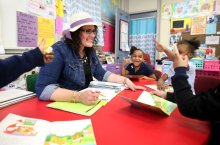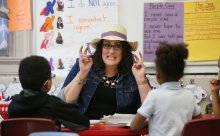
Lisa Fischman has a monster in her classroom.
His name is the More Monster and he eats, well, more. More potato chips, more pizza, more pickles, whatever food there's a greater number of, the More Monster eats it, inspiring giggles from the children in Fischman's class.
When Fischman starts drawing pictures of food on her whiteboard, the kids know what is coming: "He wants to eat things that are...," she began.
"More," the 5 and 6 year olds said in unison.
The monster -- a greater-than symbol with teeth drawn inside of it -- is one of Fischman's many creations used to blur the lines between playing and learning, a balance she's been forced to master.

"All the requirements and expectations of kindergarten have been amped up," said Fischman, a towering 32-year-old who played professional basketball in Israel before becoming a teacher six years ago. "Kindergarten is the new first grade."
Every school day, Fischman reports to an aging building just a few blocks north of Springfield Avenue in Newark's central ward. Among the state's oldest schools, Harriet Tubman School was built in 1875 -- when Ulysses S. Grant was president.
In Newark, like many other urban districts, Fischman's students face tough odds. Newark's state test scores for reading and math are among New Jersey's lowest, and about one-in-four Newark Public Schools students fail to finish high school on time, despite a rising graduation rate.
At Harriet Tubman, some students arrive without the basic social and emotional skills expected for school-age children, such as sharing or potty training, principal Malcolm Outlaw said. For them, academic learning becomes even more difficult.
Nationally, the focus of kindergarten has shifted thanks in part to high stakes testing in elementary and middle school and the ambitious goals for "college and career readiness."
"Kindergarten is not a mandatory grade in the state of New Jersey, but it where a child's academic foundation begins," Fischman said.
In a classroom where nearly every inch of wall space is covered by posters and students' art projects, Fischman's students are counting by 5s and 10s, reading short books and learning how different punctuation marks change the way they should read a sentence out loud.
"Let's take a look at page 3," Fischman asked a group of her most advanced readers. "Can you find a punctuation mark that shows us that we need to read with expression?"
One student pointed to a comma. Another to quotation marks. After Fischman told students to look at the end of the sentence, they found an exclamation point.
"When we see an exclamation point, it usually means that the writer is what?" she asked.
"Excited," one student said before the group read the sentence together in their best excited voices.
Even with the more rigorous requirements, Fischman tries to make kindergarten just as fun as it has always been. When her students count, they do it while dancing along to a music video she plays on her smartboard.
When they read, they wear green, plastic witch fingers with long, pointy finger nails for singling out each word.
And the students probably don't even realize when they are taking a test, Fischman said. To disguise what's happening, she calls her exams "brain bombs."
"I am the corniest person you will ever meet," Fischman said. "I try to teach them the way that I would like to learn."
The district considers Fischman's class a model, Outlaw said. Teachers from across the district visit to observe her approach and see what they can incorporate into their own classrooms.
Raising academic expectations for kindergarten without sacrificing students' fun isn't something every teacher can do, Outlaw said.
"It's taken her a whole lot of work in order to do that," Outlaw said. "Do you want to put in that time and effort to combine two worlds? That's what it takes and that's what she put forth."
